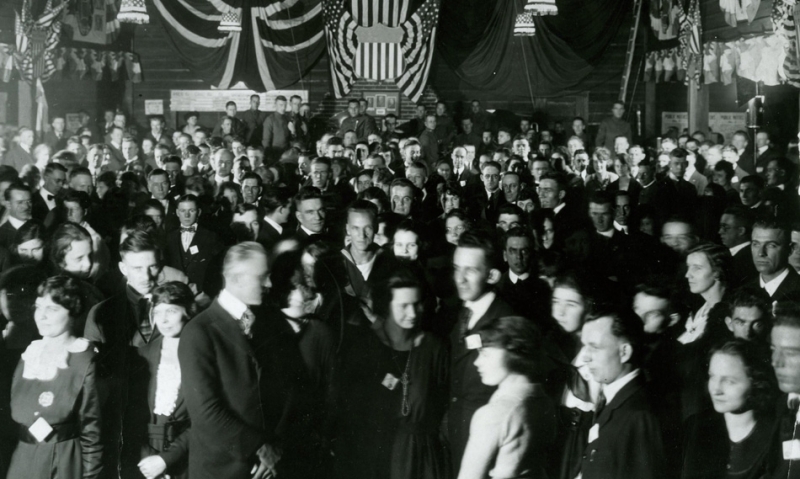
Nov. 10-12, 1919
“They will gather in Minneapolis tomorrow to launch the greatest organization of veterans in world history.”
- Minneapolis Tribune, Nov. 9, 1919
When: Nov. 10-12, 1919
Where: Convention Hall, between Marquette and Nicollet Avenue, on 11th Street, now Peavey Plaza and the Minneapolis Orchestra Hall; Radisson Hotel, Minneapolis; a canteen at 523 Marquette Ave.; the Orpheum Theater; the Minneapolis Armory; the Army and Navy Club; the Leamington Hotel; and other locations.
What: With membership exceeding 684,000, The American Legion’s first national convention draws thousands of veterans and their families from across the nation. Some 15,000 march in a cold, snowy 1st National Convention Parade. Multiple founding decisions are made, committees are defined, the constitution is made official, and Franklin D’Olier of Pennsylvania is elected first national commander.
Committees: The American Legion’s mission is reflected in the structure of its first 19 convention committees, which are Credentials, Rules, Permanent Organization, Emblem, Eligibility, Auxiliaries, Political Restriction, Finances and National Dues, Constitution and Organization, Legislation, Next Meeting Place, Permanent Headquarters, Post Activities and Memorials, Employment, War Risk Insurance, Beneficial Legislation, Military Policy, Anti-American Propaganda and Resolutions.
Resolutions passed and positions taken: Indianapolis selected as permanent national headquarters; an American Legion Women’s Auxiliary recognized for formation; universal military training favored over compulsory universal military service; Boy Scouts of America singled out for support by posts; Americanism Commission approved; schools urged to require at least 10 minutes each day for patriotic exercises and that the U.S. flag be raised over schools daily, weather permitting; $257,000 in start-up American Legion financing from founding members will be paid back; national dues set at $1 per capita; Cleveland chosen as location of second national convention; American Legion at the national, state and local levels to work with agencies to improve employment for veterans; improve veteran employment in civil service and military occupations; support the Sweet Bill and Wason Bill, to increase and expand compensation for disabled veterans and open 14 regional offices to handle War Risk Insurance claims; $75 per month for war veterans suffering with tuberculosis and $50 per month for others disabled by service; compensation levels and guidelines for veterans in federal vocational rehabilitation programs; fair disability compensation, regardless of branch of service, National Guard or Reserve status at discharge; American Legion Home Founding Act is presented, to reclaim unproductive lands for development by veterans and to make credit available for veterans to purchase homes and farms; a U.S. Air Service recommended as a separate and distinct branch of defense; all aliens who have been tried, convicted or interned for advocating overthrow of the government be deported; Department of Justice is called upon to take action, not just collect information, to stop organizations and ideologies in the United States that threaten democracy; no pardons or reduced sentences for those who used alien status to avoid the draft and deport those who fraudulently used foreign citizenship to avoid wartime service; American citizenship and language to be taught in all schools; keep the bodies of fallen U.S. military personnel in France, except when families desire their return to the United States, and establish American military cemeteries in Europe “as permanent memorials of America’s unselfish service to humanity”; “absolute rank” demanded for all Reserve Nurse Army Corps and U.S. Navy nurses; photographs, equipment and other “paraphernalia” to be collected to preserve memory and advance knowledge about the war; congressional action sought to provide rifles, cartridges, bayonets and scabbards for American Legion use at military funerals; gratitude and support for “Carry-On Clubs” that have helped disabled veterans and demand that the government provide such assistance, not merely private individuals and charitable organizations; sympathy and service, whenever called upon, for any Gold Star Woman; memorial services and graves of the Grand Army of the Republic and United Confederate Veterans to be supported by The American Legion; find the widows and children “of our deceased comrades… extending to them such care and assistance as may be within their power”; officially deplore and condemn labor strikes by police, fire and other employees committed to citizen protection; condemn all forms of anarchy and Bolshevism; commendation for American Indians who honorably served during the war, urging full rights of citizenship to them; immediate revision of the Articles of War and Court Martial laws; and assist legal authorities in the maintenance of law and order and the suppression of riots and mob violence.
“We are passing through dark and turbulent times just now and it is a wonderful comfort and reassurance to find this representative body of young men thinking clearly and speaking bravely and forcefully to support the essential principles of our government. The American Legion is the hope of the country.”
- Minneapolis Morning Journal editorial, following the first American Legion National Convention
- Convention

